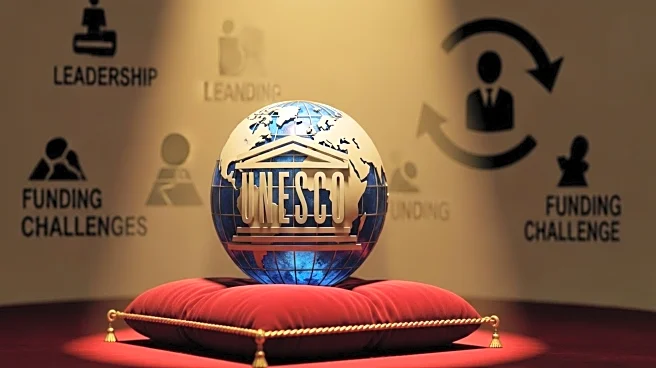What is the story about?
What's Happening?
UNESCO is in the process of selecting a new director-general, with the decision expected to be finalized by its general assembly next month. The candidates are Khaled el-Anani, an Egyptian antiquities professor and former tourism minister, and Firmin Édouard Matoko, a Congolese economist with extensive experience in UNESCO. This leadership change comes in the wake of the United States' withdrawal from the organization, a move initiated by the Trump administration due to perceived politicization and anti-Israel bias. The U.S. exit has resulted in a significant budget shortfall for UNESCO, which is renowned for its World Heritage sites and educational initiatives. The new director will need to address these financial challenges while continuing UNESCO's mission of promoting education, cultural preservation, and scientific research.
Why It's Important?
The selection of a new director-general is crucial for UNESCO as it navigates financial instability and geopolitical tensions. The U.S. withdrawal has not only impacted funding but also shifted the balance of influence within the organization, potentially allowing countries like China to exert more control. The new leader will need to secure alternative funding sources, possibly from private sectors or BRICS countries, to sustain UNESCO's programs. Additionally, the leadership choice could influence UNESCO's focus areas, with el-Anani likely to emphasize cultural programs and Matoko aiming to reduce political tensions. The outcome will affect global cultural preservation efforts and educational initiatives, particularly in developing regions.
What's Next?
The UNESCO executive board's recommendation will be followed by a general assembly vote to finalize the appointment. The new director will face immediate challenges in addressing the budget shortfall and may need to implement reforms, including potential job cuts or program adjustments. Efforts to encourage the U.S. to rejoin UNESCO could also be a priority, as restoring U.S. support would alleviate financial pressures and rebalance geopolitical dynamics within the organization. The new leader's approach to these issues will be closely watched by member states and international stakeholders.
Beyond the Headlines
The leadership change at UNESCO highlights broader issues within the United Nations system, such as financial sustainability and the impact of geopolitical conflicts on international cooperation. The organization's ability to adapt to these challenges will be indicative of its future role in global cultural and educational initiatives. The new director's success in navigating these complexities could set a precedent for other U.N. agencies facing similar issues.

















